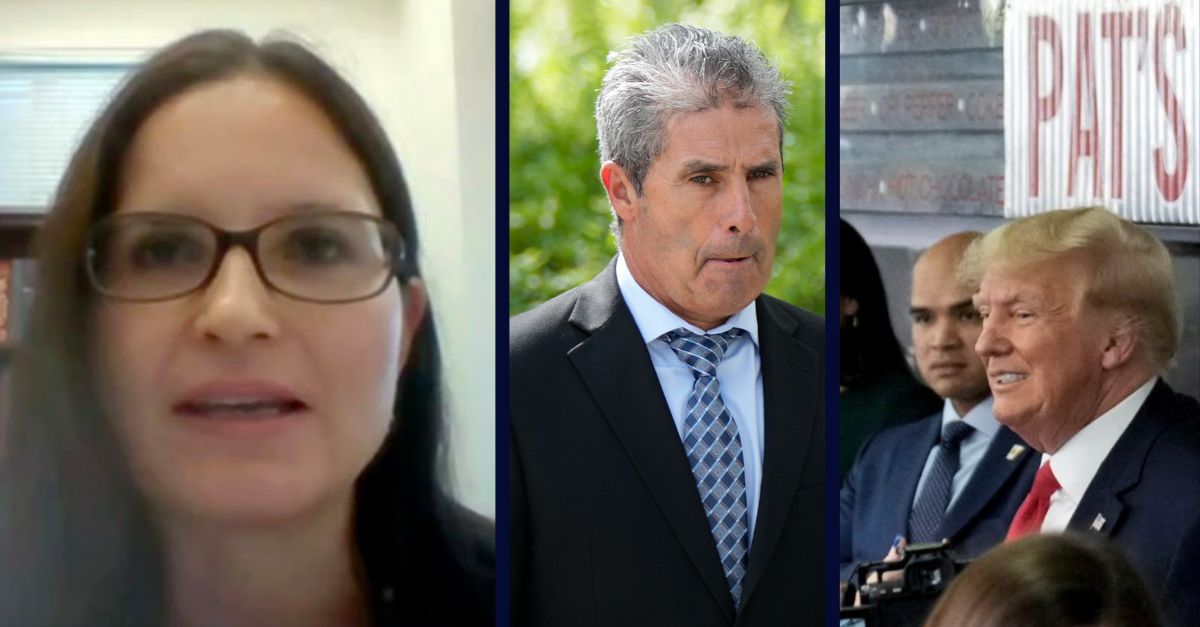
Judge Aileen Cannon (left); Carlos de Oliveira (center); Waltine Nauta and Donald Trump. (U.S. Senate; AP Photo/Rebecca Blackwell; U.S. Department of Justice)
The judge in Donald Trump’s Espionage Act prosecution has rejected two separate dismissal bids brought by the former president’s Mar-a-Lago property manager and valet co-defendants, revealing that she’s been monitoring the Jan. 6 obstruction case argued this week before the Supreme Court and reading up on conservative judges’ views on the meaning of the term “corruptly.”
While Carlos De Oliveira and Walt Nauta both fell short in their requests for a bill of particulars detailing the charges against them and motions to throw out the indictment, U.S. District Judge Aileen Cannon spent considerable time grappling with Nauta’s challenge of the obstruction charges he faces.
The judge’s order denied Nauta’s unconstitutional vagueness arguments but nonetheless called his “multiple-meanings-vagueness” claim “worthy of serious consideration,” appearing to warm to the defendant’s position that meaning of the word “corruptly” in the obstruction statute is “subject to multiple, still-developing, and contested judicial constructions of the term such that it fails to give ordinary people fair notice of the conduct it punishes and invites arbitrary enforcement.”
Cannon noted that the U.S. Supreme Court just heard arguments in Fischer v. U.S., a case that has to potential to undo obstruction charges in hundreds of cases for grinding the congressional certification to a halt on Jan. 6.
Near the start of the discussion, Cannon touched on Justice Antonin Scalia’s concurrence in the 1995 case U.S. v. Aguilar.
“Justice Scalia referred in concurrence to the ‘longstanding and well-accepted meaning’ of the term ‘corruptly’—endorsing a definition that requires proof of an act done ‘voluntarily and intentionally to bring about either an unlawful result or a lawful result by some unlawful method, with a hope or expectation of either financial gain or other benefit to oneself or a benefit of another person,”” the judge said, before turning to fellow Trump-appointed judges’ concurrence and dissent, these two from the U.S. Court of Appeals for the D.C. Circuit in U.S. v. Fischer.
More Law&Crime coverage: Mar-a-Lago judge orders Trump valet to file grand jury transcript without government witness names, tells Jack Smith to report ‘on the landscape’
Cannon first shouted out U.S. Circuit Judge Justin Walker, Justice Brett Kavanaugh’s protege, for “opining that ‘corruptly’ must require proof of an act ‘with an intent to procure an unlawful benefit either for himself or for some other person.’”
Next, she referred to U.S. Circuit Judge Gregory Katsas’ dissent against the D.C. Circuit majority’s “all-encompassing reading” of the obstruction statute, for “creat[ing] vagueness problems as well as First Amendment ones.”
“If a ‘corrupt purpose’ may suffice to show acting corruptly, what purposes count as ‘corrupt’?” Katsas asked. “Perhaps ones that are wrongful, immoral, depraved, or evil, but that would just replicate the vagueness and overbreadth concerns noted above.”
Cannon said that while her citations were “not exhaustive in scope,” Nauta might have a point considering the disagreement — or “confusion” — among the conservative judges she highlighted and the fact of Joseph Fischer’s Supreme Court case.
“The above summary, not exhaustive in scope, lends support to Nauta’s observation that the term ‘corruptly’ in § 1512 is subject to different, somewhat amorphous formulations about ‘wrongfulness’ and ‘unlawfulness’—the net effect of which is to engender legitimate questions (some might say even confusion) about the definition of the term in the realm of obstruction and related crimes,” she wrote. “Moreover, this discussion, at least in a broader sense, continues before the Supreme Court this term, as evidenced by Snyder v. United States, S. Ct. 23-108, and Fischer v. United States, S. Ct. 23-5572.”
Though she said that Nauta had raised “reasonable questions” about what “corruptly” actually means, Cannon still denied his vagueness arguments as a failure “under existing law” — “without expressing a final opinion on the specific mens rea definition to submit to the jury as to the obstruction counts[.]”
Read the order here.
Have a tip we should know? [email protected]








